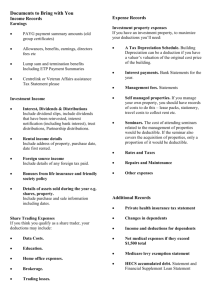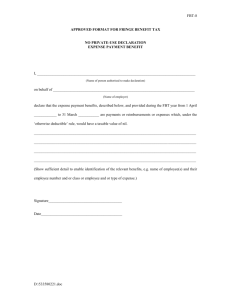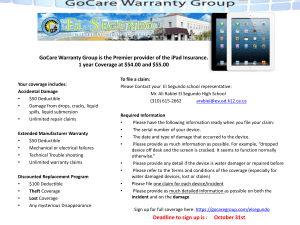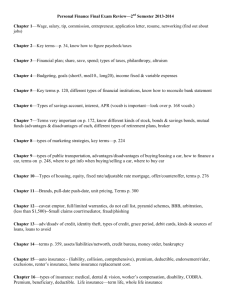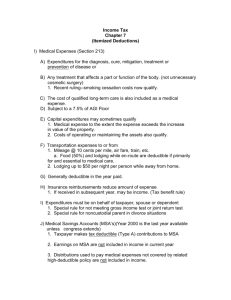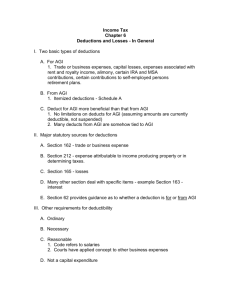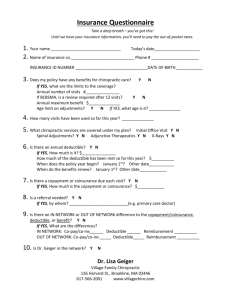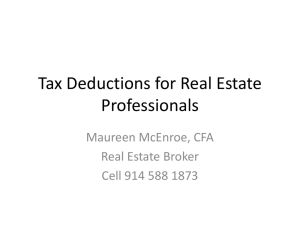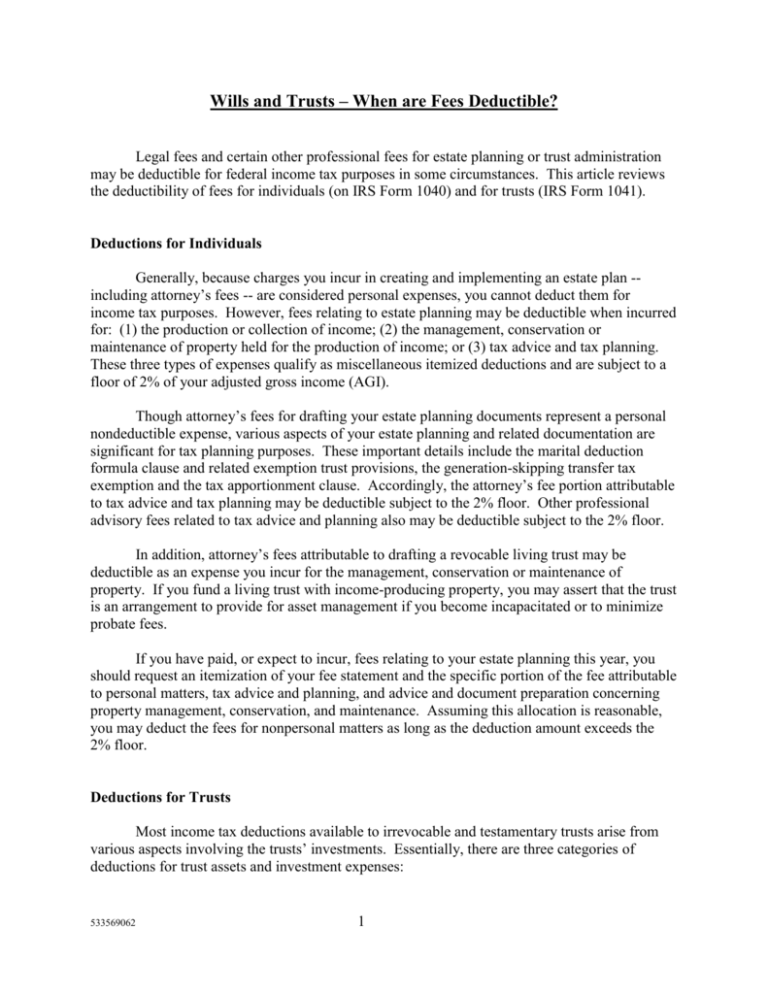
Wills and Trusts – When are Fees Deductible?
Legal fees and certain other professional fees for estate planning or trust administration
may be deductible for federal income tax purposes in some circumstances. This article reviews
the deductibility of fees for individuals (on IRS Form 1040) and for trusts (IRS Form 1041).
Deductions for Individuals
Generally, because charges you incur in creating and implementing an estate plan -including attorney’s fees -- are considered personal expenses, you cannot deduct them for
income tax purposes. However, fees relating to estate planning may be deductible when incurred
for: (1) the production or collection of income; (2) the management, conservation or
maintenance of property held for the production of income; or (3) tax advice and tax planning.
These three types of expenses qualify as miscellaneous itemized deductions and are subject to a
floor of 2% of your adjusted gross income (AGI).
Though attorney’s fees for drafting your estate planning documents represent a personal
nondeductible expense, various aspects of your estate planning and related documentation are
significant for tax planning purposes. These important details include the marital deduction
formula clause and related exemption trust provisions, the generation-skipping transfer tax
exemption and the tax apportionment clause. Accordingly, the attorney’s fee portion attributable
to tax advice and tax planning may be deductible subject to the 2% floor. Other professional
advisory fees related to tax advice and planning also may be deductible subject to the 2% floor.
In addition, attorney’s fees attributable to drafting a revocable living trust may be
deductible as an expense you incur for the management, conservation or maintenance of
property. If you fund a living trust with income-producing property, you may assert that the trust
is an arrangement to provide for asset management if you become incapacitated or to minimize
probate fees.
If you have paid, or expect to incur, fees relating to your estate planning this year, you
should request an itemization of your fee statement and the specific portion of the fee attributable
to personal matters, tax advice and planning, and advice and document preparation concerning
property management, conservation, and maintenance. Assuming this allocation is reasonable,
you may deduct the fees for nonpersonal matters as long as the deduction amount exceeds the
2% floor.
Deductions for Trusts
Most income tax deductions available to irrevocable and testamentary trusts arise from
various aspects involving the trusts’ investments. Essentially, there are three categories of
deductions for trust assets and investment expenses:
533569062
1
(1) Trade- or business-related expenses. If a trust is engaged in a trade or business, it is
entitled to deduct all ordinary and necessary expenses paid or incurred during the
taxable year in which it carried on such a trade or business.
(2) Expenses relating to income production. A trust is entitled to various deductions if
it holds property that generates profit. These include deductions for administrative
expenses such as professional fees for the trustee, attorney and accountant.
(3) Miscellaneous expenses. These include deductions for tax advice and representation,
personal exemptions, casualty or theft losses, payment of taxes and charitable
contributions. If a trust incurs a miscellaneous expense, it is deductible only to the
extent it exceeds 2% of the trust’s current AGI.
There are, however, three miscellaneous expense items that have unique applications to a
trust and are fully deductible: (1) distribution deductions, which represent the income actually
paid to the trust beneficiaries; (2) special personal exemptions, which depend on whether the
trust is considered a simple or complex trust; and (3) administrative costs incurred only because
the property is held in a trust, and that would not have been incurred otherwise.
Because a trust may hold a vast array of securities and investments, a fiduciary will incur
investment advisory fees if he or she hires an outside professional to analyze the trust’s
investments, make recommendations and carry out trading. Due to differing court opinions in
certain federal circuits, it is unclear whether costs for outside investment advice paid by a trustee
are fully deductible or are subject to the 2% floor. To be fully deductible, these costs must be
unique to the trust’s administration, such as the trustee’s fees and trust accounting fees mandated
by law or by the trust instrument. Arguably, if state law mandates that a trustee manage trust
assets as a prudent investor, the costs for outside investment advice should be fully deductible.
Meanwhile, in states without a prudent-investor requirement, the costs for outside investment
advice may be labeled as a miscellaneous expense and only be deductible subject to the 2%
floor.
To qualify the cost of obtaining outside investment advice as a fully deductible expense,
fiduciaries can pay for the service directly and then increase their trustee’s fees by that amount.
Doing so makes the fee unique to the trust.
Planning Is Key
Fees for professional services, such as those paid to the trust’s attorney, accountant and
trust administrator, may be either fully deductible or partly deductible, depending on the
circumstances. Planning for how you or the trust incurs the expense or cost may make a
difference at tax season. Please contact us to discuss the deductibility of such fees and expenses
in your particular situation.
533569062
2
Sidebar: Deducting Business-Planning Fees
Estate planning often will involve professional services rendered not only to an individual
client, but also to a related business entity, such as a corporation, limited liability company or
partnership. Typically, these services involve document preparation such as articles of
incorporation, partnership agreements, buy-sell agreements, corporate restructuring documents,
employee benefit plan agreements and executive compensation agreements or deferred
compensation plans. Fees for these professional services should be charged directly to the
business enterprise, which may then deduct (or amortize) them as an ordinary and necessary
business expense.
(Copyright © 2003-2004, all rights reserved. Provided by Martin L. Pierce, 423.240.6104,
mpierce138@comcast.net. Martin is a Business and Tax attorney who is Certified as an
Estate Planning Specialist.
DISCLAIMER: This article provides general coverage of its subject area. It is provided
free, with the understanding that the author, publisher and publication do not intend this
article to be viewed as rendering legal advice or service. If legal advice is sought or
required, the services of a competent professional should be sought. The author and the
publisher shall not be responsible for any damages resulting from any error, inaccuracy or
omission contained in this publication.)
533569062
3

